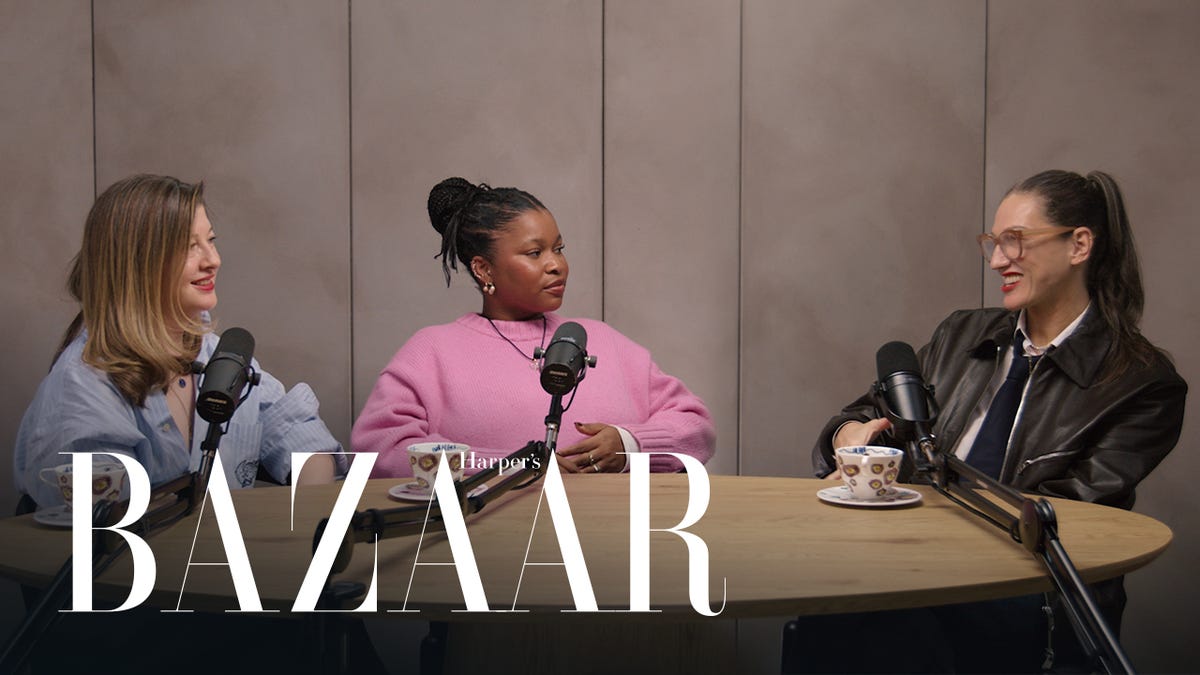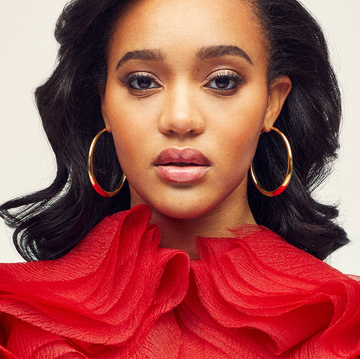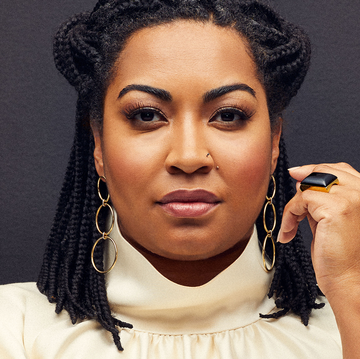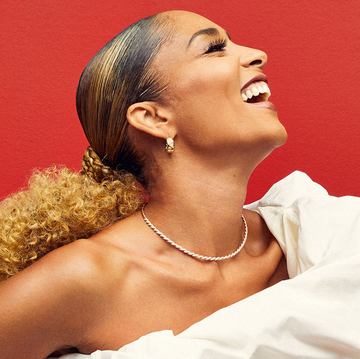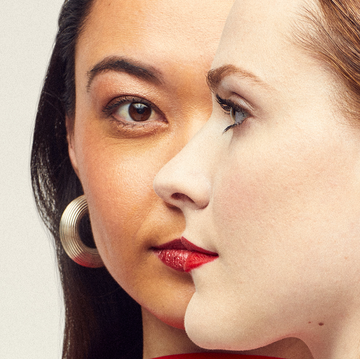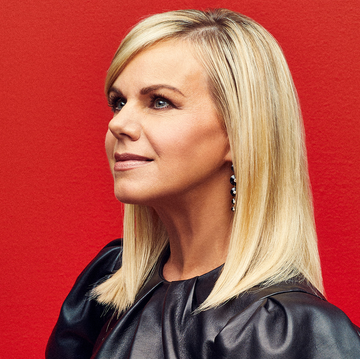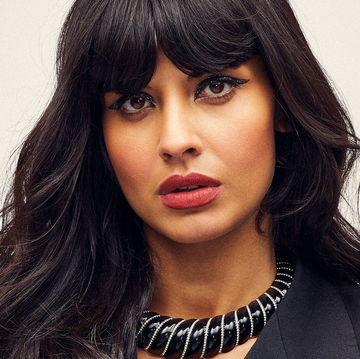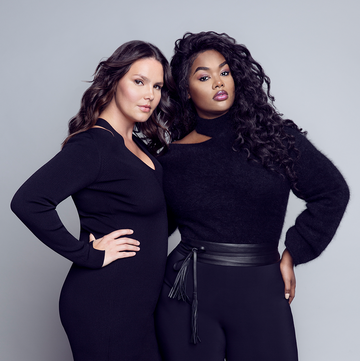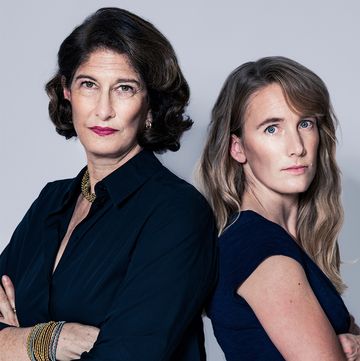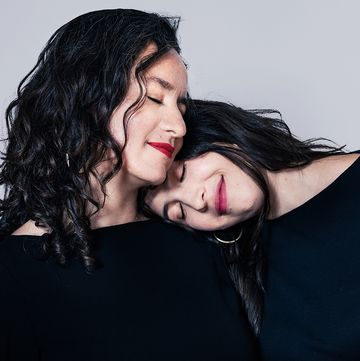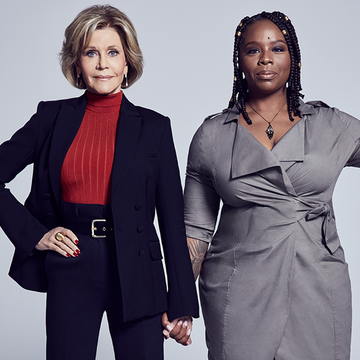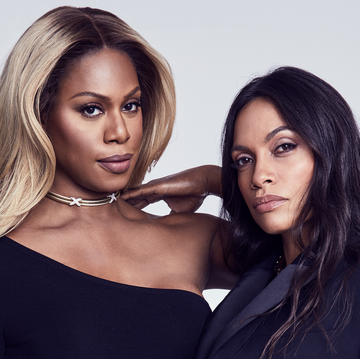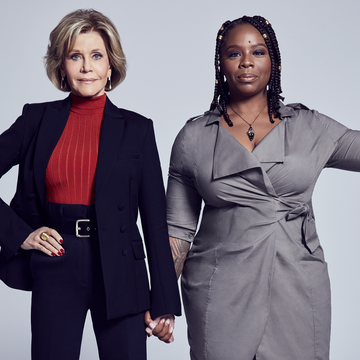Friends for more than two decades, Uma Thurman and Jennifer Rudolph Walsh have been through a lot together. Walsh, the founder of Together and a WME board member, first met Thurman in 1995 when she moved next to her in New York. The pair has gone on to conquer motherhood and their respective careers (Walsh leads WME's Literary division and is producing the Together tour, and Thurman, well, you already know her story); and now, more than 20 years later, they sit down to talk about what being daring means to them as they climb towards their next big challenge.
Jennifer Rudolph Walsh: How do you define someone as daring?
Uma Thurman: For me, it's trying to constantly fight type and be willing to explore genres and things that people think you can't do and don't want to let you do. We're in an environment where everyone gets compartmentalized very quickly. But I think we are living in a time, where as a whole, as a community, people do want to push the boundaries. One feels so despairing on some levels about what's going on in our culture, in regards to things like gender inequality. But there is progress. There is enhanced empathy and respect for others, we are fighting the tide, even though it seems like a tug of war sometimes.
JRW: We've all become awakened in a way that doesn't allow us to return to a place where we pretend we don't see what's being shown to us.
UT: Somebody was saying, and I think it was an interesting way to think about it, that the argument about marriage equality will one day seem as arcane and shocking to us as the fact that Rosa Parks had to get up and go to the back of the bus. Reading recent history is good to humble yourself, and also to feel some hopefulness that there is progress. Daring, to me is having courage; personally it's a daily meditation to take breath and find strength.
JRW: You know what was daring in my opinion? Moving to China with a two-year-old baby while you were still nursing. Nursing by day, sword fighting by night.
UT: It was physically very difficult.
JRW: Is that a kind of daring?
UT: You know what daring really is to me? It's maybe much more simple: the willingness to get up and try it again. It's not about whether or not you fall down, it's how you get back up. And I've taken quite a few tumbles, myself.
JRW: That's what I love about you.
UT: No really. I've always had a backache and I had a body MRI and the guy started laughing and he was like, "You know that you broke that bone like five years ago." And I was like, "Nope!" (Laughs). So you know, it's just the courage to also see your defeats as opportunities. To say, "Ok, this is painful but what does this offer me? What's the takeaway? What's the plus?"
JRW: To me the real failure is not trying.
UT: It is technically a failure when you don't try. It's an interesting thing to be in your forties and evaluate success and take ownership of some disasters and some pain and try to forgive a little bit—yourself and others. You know, none of this is small stuff...
[instagram ]https://www.instagram.com/p/BEmJ_rvuscm/?taken-by=ithurman&hl=en[/instagram]
JRW: If you had the opportunity, what would you say to yourself 20 years ago?
UT: Here's what I would say: I would be like, "All right, sit down, you're not going to believe this! No, no, no keep reading it's going to be okay." But I guess I'm lucky to have been blindsided. I'm lucky to have gotten into fistfights, in a way. I'm lucky I learned how to stop them. At some point I would tell myself probably, "Don't be so judgmental, you will see…" And I have seen. I certainly know I have been blessed with much more empathy than I ever knew I would feel for other people.
JRW: I don't think I could be sitting here without the incredible support you've given me throughout this entire creative process; you're just always pushing me to speak my truth and to be daring. Nothing could be more exemplified of that than incredible friendship and the love you've given me through this process. I thank you and I love you. You were really the first friend I made who was just really nice about my daughter. I was only 26 when she was born. People didn't really know what to make of young motherhood.
UT: Urban women don't breed in their twenties. Shortly after, I became a mother too, which is why I was probably so child friendly.
JRW: I remember one time I was home alone with my daughter and I couldn't leave my house and you said "Let's hang out!" and I said, "I can't because my daughter is here," and you replied, "That's ok, I'll come over." I hadn't had anybody in this city understanding of my situation, so we became fast friends.
UT: It's true. Socially, most people delayed motherhood for five to 10 years around us.
JRW: Yeah…most of my friends were having their first child when I was having my third child. So we've basically been supporting each other and taking care of each other's children ever since.
[instagram ]https://www.instagram.com/p/3evnQpOsVu/?taken-by=ithurman&hl=en[/instagram]
UT: You were the person I had [to talk to] all the time. As one does with a first child, I found out that my baby could roll by hearing the sound of her body hit the ground at 4 a.m. and obviously, for any new parent, that is the most horrifying thing that could happen, right? You're exhausted and you take your tiny little baby out and you put them on the bed to change diapers before nursing and you turn around and you discover...my baby can roll! And you think you're going to die. And the person I was willing to wake up to ask what I should do was you. You've been a star my whole life and always empowering. You always look to turn the issue from the offensive to an opportunity and that's something that's been invaluable and I think very unique. Without people like you, the world would stop turning. You're a person that keeps kicking that ball around in a circle. And you know it rotates at the same pace.
JRW: I don't know about that.
UT: Well, I think that life force is invaluable. For 20 years you devoted yourself to first your own agency—you took that over, it moved to William Morris, it became WME, you focused on that. Those were your creative families. What motivated you to start Together?
JRW: The idea of creating a culture that was really about people being seen, being understood, having their potential being brought to the forefront, seeing different ways they could live a more impactful, more balanced life. I really believe in my heart that storytelling has the power to transform lives. We helped Oprah Winfrey go around the country with "The Life You Want" tour and Arianna Huffington's "Thrive," but all the while I kept thinking that I wanted to have a way to keep people together after the events happened. We're creating Together Circles via an app that you can download to help connect people after our events. Our storytellers are not telling you how to live or what to do. They are sharing their vulnerable truths with you. And the audience will be sharing their stories, and the people from the stage will be sharing their stories. There really is no speaker and audience roles—we are all going to be storytellers in different ways. And then we have exercises that help us actually uncover our purpose and put our purpose into action. For example, if your thing is all about girls and education, which I know is one of the very big things for you, and you happen to have just moved to Portland, Oregon, and you're at our event, we are going to connect you with other women, intergenerational, from completely different perspectives in the world, but who all share your desire to fight for education for girls. And every month we are going to be giving you original content, we are going to give you opportunities for volunteering, for mentorship, for social action, so that the promises we make at these events we follow through with for the rest of the year. Our communities will stay together and grow together.
The point of Together is that we identify your purpose and we connect to a community that supports that purpose. We help people look at their lessons, their gifts, their strengths, their life and come to something that has always been there and that you kind of knew, but once you see it in a clear statement you realize: "This is my purpose." All the other stuff gets very clear because you're going to be in alignment and you're going to be serving that purpose and then creating the change you want to see in the world through that. So everybody at our events is going to come away with a template that is basically going to speak to their personal purpose. We are creating this for women and the cool men who want to come. Eventually one day I hope this will be half women and half men, because this is really simply about the idea that together is better and that there's more than enough to go around. More than enough love, enough success, and joy and healing for everybody.
UT: When did you really see your own purpose?
JRW: I took myself to Wharton for a leadership/executive degree. I knew a leadership quality was necessary to make William Morris work. And I knew I didn't have it, but I knew something was missing, an ingredient was missing. I wanted to be able to at least identify it even if I wasn't the person to step into that role. And so I spent five weeks at Wharton, which was a sacrifice, because I had young children at the time. Everyone's purpose is different and you know what I've said, self-help is a wonderful thing and it's changed my life certainly and I know it has yours, too, but if it was working we wouldn't have a culture that is completely anxious, depressed, lonely, addicted, overweight...all of these issues that we have. I think one of the big issues with self-help is that the first word is "self". We need to shift from the "me" to the "we". Your purpose doesn't need to be mission-based, but it needs to be shared.
[instagram ]https://www.instagram.com/p/vWU-3sOsSJ/?taken-by=ithurman&hl=en[/instagram]
UT: Interesting. I mean, it's one of the things that weirdly I always used to like about my job: that expressing the emotions of a writer or someone creative and breathing empathy and life into a character people can then identify with, that they'd feel less alone. Some of the things I've done that I like most, like Hysterical Blindness, which was long ago now on HBO, but it was a service of showing that openness—that someone can feel the narrative is articulating something for them that is freeing and healing.
JRW: Yeah that "me too" moment where someone is watching and thought, "Oh my god, I thought I was the only one!" I totally get that in what you do. Because I think that is what storytelling is about, it's about finding people where they are and connecting.
UT: You are one of the few people I know who has an intact and thriving family. I think you apply the same type of living energy you apply as a mother, to your company. And you wanted to see good behavior rewarded for people and for people to be inspired and for people to be seen and understood and their talents brought out of them. If you went back 20 years ago, what would you say to yourself?
JRW: I think I would just say, "Relax sweetheart, try easier, it's all going to come, it's all going to unfold in perfect time for you. And all the breadcrumbs are being left for you. And everything you need will be exactly where you need it to be at exactly the moment that you need it." When I think back on that person, I just tried so hard. It really took me a long time to get to that place of not making it happen, but letting it happen. That great dance between the two of those things has been a lifetime of experience and letting go and trusting for me. And I do feel now that I'm more able to access that space between making it happen and letting it happen.
Together is embarking on a 6-city tour this October, with special guests including Abby Wambach, Sophia Bush, Alicia Keys and Ciara. Buy your ticket here.


